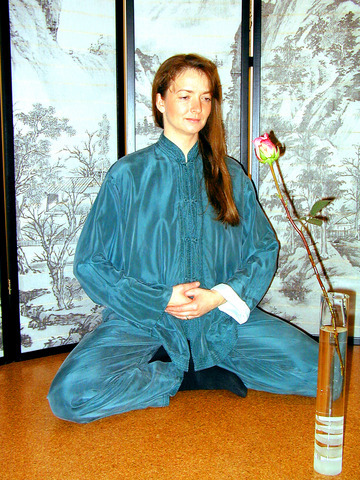A growing number of doctors and clinics in the West are recommending the Chinese body art of qigong as an effective way of harmonizing body and spirit.
"Qigong is increasingly becoming part of therapy concepts in clinics," says Gisela Hildenbrand of the Medical Association for qigong in Bonn, Germany.

PHOTO: DPA
Qi, pronounced as tshi, can be translated as "life force energy." Gong means "steady practice."
The more than 2,000 exercises deal mainly with conscious body posture, gentle movements and breathing while standing, sitting or lying.
The movements bring the qi back into flow, harmonizing body and spirit. Qigong teacher Detlef Klossow in Dusseldorf describes the movements as "moving meditation." They have poetic names like "small temple in the morning" or "swimming dragon."
The person bends the body sideways, lifts the arms and sinks them back toward the ground. "The routine movements let the energy flow especially in the spine and the joints," Klossow says. Often specific breathing techniques lend emphasis to the movements.
"The practitioner is very gentle with himself as if observing from the outside to the inside," says Klossow. The power comes from this ritual, but he notes that many people can't stand the silence. "It makes them mad that everything is done very quietly."
Teachers recommend that the exercises be done daily -- even if only for a few minutes. "But many people don't even take this time for themselves because they regard their day as being packed full,"Klossow says.
But especially in situations of great stress these movements can be especially helpful to get a distance from daily routine. "Qigong is a good alternative to taking another cup of coffee and a cigarette," the teacher says.
The exercises appear simple but their effectiveness should not be underestimated. Several studies have been conducted on their effectiveness for asthma and migraine patients.
"The results confirmed our experience. The patients had less of the attacks and needed less medication," Hildenbrand says.
Klossow warns that qigong can't be learned from books and is best practised with an experienced instructor. It is however easier to learn than tai chi which is also know in the West as shadow boxing. Qigong is a good way of starting to learn the Chinese body arts but qualified instructors or trainers should be chosen, the experts recommend.

April 28 to May 4 During the Japanese colonial era, a city’s “first” high school typically served Japanese students, while Taiwanese attended the “second” high school. Only in Taichung was this reversed. That’s because when Taichung First High School opened its doors on May 1, 1915 to serve Taiwanese students who were previously barred from secondary education, it was the only high school in town. Former principal Hideo Azukisawa threatened to quit when the government in 1922 attempted to transfer the “first” designation to a new local high school for Japanese students, leading to this unusual situation. Prior to the Taichung First

The Ministry of Education last month proposed a nationwide ban on mobile devices in schools, aiming to curb concerns over student phone addiction. Under the revised regulation, which will take effect in August, teachers and schools will be required to collect mobile devices — including phones, laptops and wearables devices — for safekeeping during school hours, unless they are being used for educational purposes. For Chang Fong-ching (張鳳琴), the ban will have a positive impact. “It’s a good move,” says the professor in the department of

On April 17, Chinese Nationalist Party (KMT) Chairman Eric Chu (朱立倫) launched a bold campaign to revive and revitalize the KMT base by calling for an impromptu rally at the Taipei prosecutor’s offices to protest recent arrests of KMT recall campaigners over allegations of forgery and fraud involving signatures of dead voters. The protest had no time to apply for permits and was illegal, but that played into the sense of opposition grievance at alleged weaponization of the judiciary by the Democratic Progressive Party (DPP) to “annihilate” the opposition parties. Blamed for faltering recall campaigns and faced with a KMT chair

Article 2 of the Additional Articles of the Constitution of the Republic of China (中華民國憲法增修條文) stipulates that upon a vote of no confidence in the premier, the president can dissolve the legislature within 10 days. If the legislature is dissolved, a new legislative election must be held within 60 days, and the legislators’ terms will then be reckoned from that election. Two weeks ago Taipei Mayor Chiang Wan-an (蔣萬安) of the Chinese Nationalist Party (KMT) proposed that the legislature hold a vote of no confidence in the premier and dare the president to dissolve the legislature. The legislature is currently controlled